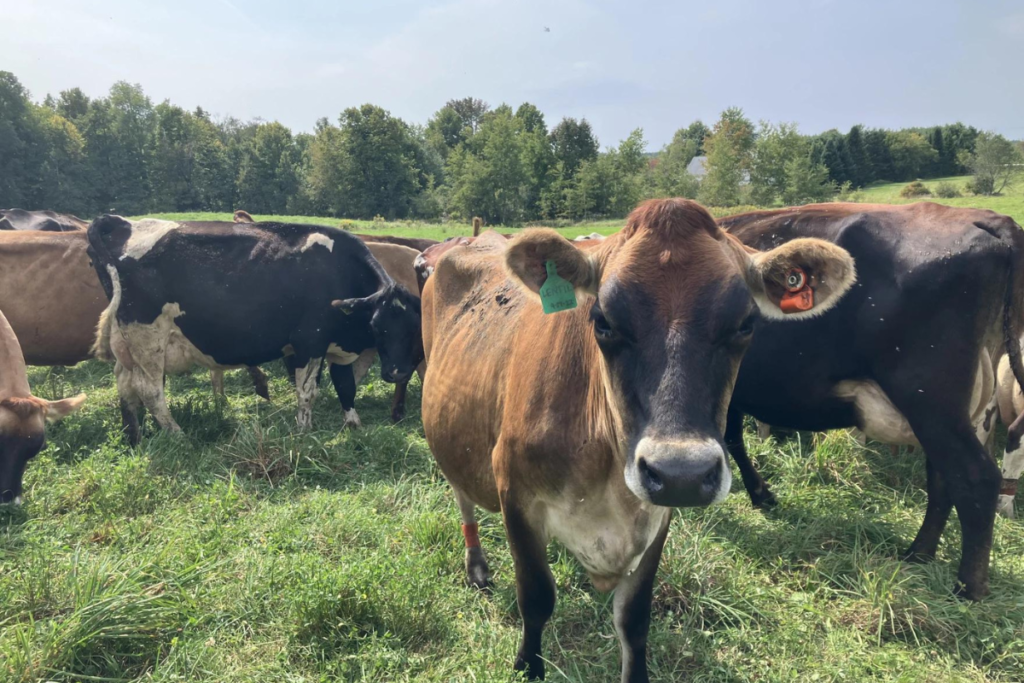by Lori Valigra

Dairy cows graze on pasture at The Milk Room farm in Monmouth. Credit: Peter McGuire / Maine Public
While farmers and brewers expect to take a hit from tariffs, they say they will try to hold off on charging consumers more for now.
Maine farmers and brewers want to hold off raising prices for consumers even though they expect the sweeping tariffs the Trump administration plans to introduce tomorrow to raise their costs of doing business, representatives from those two industries said in a press briefing Tuesday.
Farmers have been reevaluating planting plans as they expect fertilizer and other goods to rise steeply in price, said Sarah Alexander, executive director of the Maine Organic Farmers and Gardeners Association, which certifies 540 organic farms and operations, mostly in Maine. The organic farming industry has more than $50 million in annual sales in Maine, according to the U.S. Department of Agriculture census. Rising prices expected with the higher tariffs, especially against Canada, are stressing Maine’s farmers.
“I’ve been in several conversations recently where farmers are worried about their overall farm viability, but they’re also worried about really getting food out to all of those who need it,” Alexander said.
In one case, she heard from a farmer who planned to add a greenhouse this spring to increase production, but the price of the greenhouse has risen 50 percent because of steel and aluminum tariffs. The farmer is now trying to decide if he can build the greenhouse this year.
“That could ultimately mean less food is going to be grown in Maine that could otherwise be provided to our local communities,” she said.
Farmers will try to hold off on passing on increased prices to consumers as long as they can, she said. But with already slim margins at farms, consumers will see some price increases over the course of the season the longer the trade wars go on.
Farmers expect already high costs for feed and fertilizer — driven by inflation — to increase even more with the tariffs, said Annie Watson, president of the Maine Dairy Industry Association and co-owner of Sheepscot Valley Farm. The farm in Whitefield milks 70 cows and has another 90 cows on the organic farm. Its milk is processed into yogurt by Stonyfield in New Hampshire.
The farm imports all of its organic grain from Canada. Watson said she expects an increase of $100 per ton for its organic grain, which for 70 cows is an additional $1,200 to $1,400 per month.
“These are not optional costs for our farmers,” she said. “You have to feed your herd, and we don’t even know what the charges will be for our conventional grain prices yet.”
In addition, most of the fertilizer companies are located in Canada, she said. The fertilizer companies import some ingredients from the United States, paying an import tax for them, and then mix them into the final product, which is hit with another tariff when it is exported to farmers in the United
States. At least one Canadian fertilizer company already has said it will open an operation in Maine to avoid some of the tariffs.
Watson said farmers are concerned that ingredients charged on the way to Canada and again after they are mixed and exported to Maine will significantly increase the cost of fertilizer.
“This will result in even more dairy farms closing their doors,” she said. “A trade war with neighbors like Canada will absolutely hurt Maine dairy farmers.”
Read more: Bangor Daily News